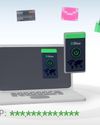
At its Build 2024 conference, Microsoft unveiled a new AI trick for Windows PCs—one that can help users locate or remember details from their digital past. It could be looking for a PDF file worked on a couple of weeks ago. Or perhaps finding the name of a restaurant recommended by a friend earlier this year. Called Microsoft Recall, this feature could save you many lost minutes trying to hunt down whatever’s eluding your memory.
Yet even before its launch, Microsoft Recall (fave.co/4bVAAwo) is already giving security experts indigestion. Underneath the futuristic shine, Recall comes with a potential massive hit to user privacy—and by extension, security. Here are the reasons for the unease—and what you should do when you actually encounter Microsoft Recall in the wild.
1. IT WATCHES AND RECORDS EVERYTHING YOU DO ON YOUR PC
When active, Microsoft Recall monitors your every move while you’re on your computer, capturing screenshots every five seconds as your screen changes. Local AI helps Windows determine when you’ve done something different enough to warrant a screen grab.
Local AI also assists in parsing the images to extract text, so that details can be offered as search results whenever you decide you want to look up, say, the green jacket you saw online a few weeks ago.
By default, Microsoft Recall will commandeer anywhere between 25GB to 150GB (fave.co/45v5CZt) on your storage drive—up to about three months’ worth of data. Nothing is sacred, either. Passwords, tax details, and other sensitive details (really, anything you do) are fair game. To protect some of your privacy, you must manually exclude websites, private browsing sessions (if you don’t use Edge), and applications from Recall’s reach.
This story is from the July 2024 edition of PCWorld.
Start your 7-day Magzter GOLD free trial to access thousands of curated premium stories, and 9,000+ magazines and newspapers.
Already a subscriber ? Sign In
This story is from the July 2024 edition of PCWorld.
Start your 7-day Magzter GOLD free trial to access thousands of curated premium stories, and 9,000+ magazines and newspapers.
Already a subscriber? Sign In

Private Internet Access: A low-price, high-value VPN for everyone
This veteran VPN shows it can still hang with the best.

Hands-on: Kensington's first Thunderbolt 5 dock is built for the future
Thunderbolt 5 is here...but you'll need more than just this well-built Kensington dock to take advantage of it.

Tested: Intel's Lunar Lake chip wants you to forget Qualcomm laptops exist
Great battery life, mediocre performance, surprisingly decent gaming: That is how Intel's Lunar Lake chip stacks up.

7 laptop habits that coax the most out of your battery
Don't send your laptop into an early grave.

WordPad is gone from Windows 11. Here's how to bring it back
With the arrival of Windows 11 version 24H2, WordPad is officially gone. Want to keep using it? You're in luck.

Hackers know your social security number. Here's how to stay safe
Thanks to a multitude of data leaks, your most sensitive information is now easily accessible to the world.

20 insanely useful Windows 11 keyboard shortcuts I use every day
After so many years, I'm still discovering new keyboard shortcuts.

WHAT THE HECK IS AN NPU, ANYWAY? HERE'S AN EXPLAINER ON AI CHIPS
ALL PCS WILL SOON HAVE NEURAL PROCESSING UNITS. HERE'S WHAT THAT MEANS FOR YOU IN SIMPLE TERMS.

WINDOWS 11'S 2024 UPDAATE: 5 BIG CHANGES I REALLY LIKE (AND MORE)
WINDOWS 11'S ANNUAL UPDATE IS ROLLING OUT OVER THE NEXT FEW WEEKS.

Hackers are using AI-generated code for malware attacks
Two separate attacks have been spotted using code that was probably written by artificial intelligence.